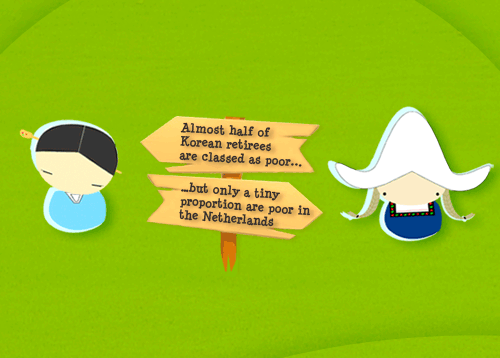Britain
According to new data released by Open Knowledge, British citizens over 60 are the best educated in Europe, and are also required to spend the least on their health. In terms of consumption, British retirees are also the most cultured in Europe (12.1 per cent of their pension is spent on cultural pursuits, compared to the 7.1 per cent European average).
Despite spending just 1.3 per cent of our pensions on our health we Brits are also the least active pensioners in Europe, managing only 13 minutes a day performing physical activities. If we compare this to the Spanish, who spend an hour more than us staying active, we can see that our pensioners really are the layabouts of Europe!
What about the rest of the world? How do British pensioners compare to those in Mexico, South Korea, and Germany for example? Here’s a look at some of the figures recently released by OECD and Eurostat that give us some fascinating insights into retirement around the world.

Mexico
Although the British can expect to live until they are 80, people in their 40s and 50s lament the fact that they won’t be able to retire until they are in their late 60s. If we compare this to the state of Mexican pensions, these Brits may start to feel guilty about their outrage. In Mexico the official age of retirement is 65, however one in five Mexicans over 65 live in poverty. This means that, on average, men have to work until they are 72.3 years old – a very worrisome figure considering the fact that the life expectancy is just 71.4!

South Korea
Despite evidence of a strong economy in the Republic of Korea, nearly half (45.6 per cent) of its senior citizens live in relative poverty. When we compare this to the UK, where only 8.6 per cent of over 65 year olds are unable to support themselves, we can appreciate the extent of the poverty in Korea. 45.6 per cent is four times the OECD average and is a figure that is predicted to get a whole lot worse with Korea’s increasing old-age dependency ratio.
France
France also has an ageing population but is accommodating for this by expanding its public spending on pensions. It has raised the normal age of retirement to 62 and the age to get a full pension to 67, meaning that with life expectancy at 78.7 its citizens still have ample time to enjoy their autumn years. What do senior citizens enjoy doing in France? Retail therapy is apparently a popular pastime, as is travel, however they lag well behind the UK when it comes to cultural pursuits, allocating just 6.9 per cent of their pension.

The Netherlands
Financial security is paramount to enjoying one’s retirement, and Dutch retirees seem to be the most prudent financial planners. Only 1.4 per cent of Dutch pensioners fall into the “financially at risk” category, which is six times smaller than the UK. They are using this financial freedom to enjoy things like travel and eating out.

Germany
Germany currently spends around 10 per cent of its GDP on public pensions, a similar figure to Belgium and Slovenia. But the country is also facing rapid population ageing due to increasing life expectancy and low fertility rates, meaning that the government is expected to be spending 13 per cent of GDP on pensions by 2050, which is higher than the European average. What will that money be going on? It may surprise you to hear that, despite festivals like Oktoberfest and a global reputation for quality breweries, the Germans spend the least in Europe on alcohol – almost half as much as pensioners do here in the UK. Instead, senior Germans like to indulge their passions for travel and culture.

Spain
There have been a number of reforms to Spanish pensions during the last few years, due to the economic crisis combined with a rapidly ageing population. It is currently 10 per cent of public expenditure but, in contrast with Germany, this figure is set to fall. Old age poverty is relatively low though and fell from 15.1 per cent to 12.8 per cent between 2007 and 2010. As is to be expected, Spanish pensioners spend most of their income on dining out: 7.3 per cent to be exact. In order to put this into perspective, all Eastern European countries, including Latvians, Slovakians, Bulgarians, all spend well under 2 per cent of their income in restaurants. In the UK we allocate 6 per cent.
Despite many people in the UK bemoaning the state of the current pension system, the figures from these pension studies show that, relative to the rest of the world, UK retirees are pretty well off. We enjoy a below average level of old age poverty, a higher than average GDP, and an average of 15 years to enjoy a wealth of culture, travel, and not doing any exercise!

